高中英语选修六第五单元教案
- 格式:doc
- 大小:49.00 KB
- 文档页数:6
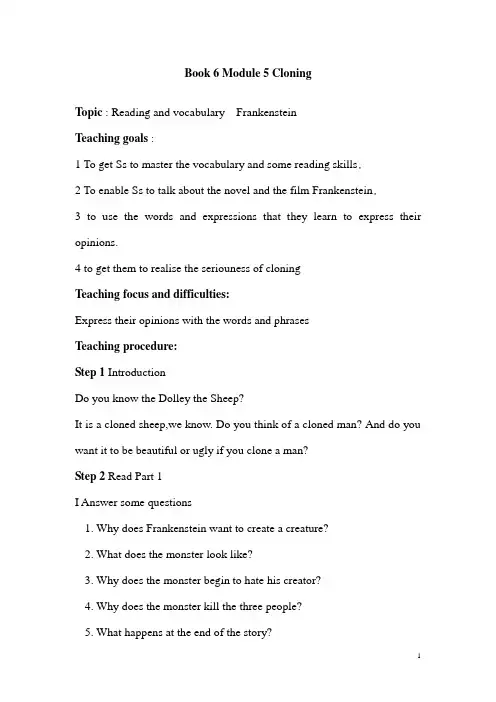
Book 6 Module 5 CloningTopic : Reading and vocabulary FrankensteinTeaching goals :1 To get Ss to master the vocabulary and some reading skills.2 To enable Ss to talk about the novel and the film Frankenstein.3 to use the words and expressions that they learn to express their opinions.4 to get them to realise the seriouness of cloningTeaching focus and difficulties:Express their opinions with the words and phrasesTeaching procedure:Step 1 IntroductionDo you know the Dolley the Sheep?It is a cloned sheep,we know. Do you think of a cloned man? And do you want it to be beautiful or ugly if you clone a man?Step 2 Read Part 1I Answer some questions1. Why does Frankenstein want to create a creature?2. What does the monster look like?3. Why does the monster begin to hate his creator?4. Why does the monster kill the three people?5. What happens at the end of the story?II Retell the story of Frankenstein according to the given words.Step 3 Read Part 2I Read carefully and say if the sentences are ture or farlse.II Read paragraph 3 about his regretful feelings and complete the blanks.I had worked for nearly_______to give life to a _____body. But now I had finished, the beauty of the dream ____. I wish _________________, I wish ________________________,and I wish ___________. I felt _____to stay in the same room as him. At last, I _________________in my clothes, having ____ dreams. I dreamt I saw my _____. At the same moment, I saw the ______that I had created, standing by my bed and watchin g me. I hid in the garden, thinking “I wish ______________________,I wish ___________.”Step 4 Role-playSuppose you are Frankenstein, you chase the monster to the Arctic where you meet Captain Walten who tries to find the way to the Arctic. Talk about your feeling that you regret creating such a monster.Some questions may help you:Captain: What happened?Can you tell me?Frankenstein: I created a monster that ---(resemble; skin---)Captain :Why do you create it ?Frankenstein:I discover--- ; and I regret having created such a monster. ---two years--- I dreamt ---Captain :Why are you here?Frankenstein:I refused to ---- He killed---Captain :----Step5 DiscussionAnswer the questionWhat do you think of the monster? Do you think it is wicked? Possible answer:The monster, who has learnt to speak, is intelligent and has human emotions even though he is ugly.He wants a friend but people hate him and chase him.He wants a wife but is refused.Step 6HomeworkTo clone or not to clone?。
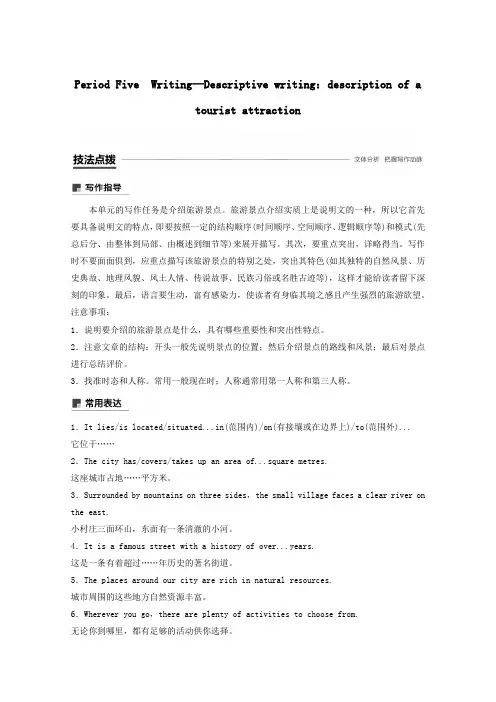
Period Five Writing—Descriptive writing:description of atourist attraction本单元的写作任务是介绍旅游景点。
旅游景点介绍实质上是说明文的一种,所以它首先要具备说明文的特点,即要按照一定的结构顺序(时间顺序、空间顺序、逻辑顺序等)和模式(先总后分、由整体到局部、由概述到细节等)来展开描写。
其次,要重点突出,详略得当。
写作时不要面面俱到,应重点描写该旅游景点的特别之处,突出其特色(如其独特的自然风景、历史典故、地理风貌、风土人情、传说故事、民族习俗或名胜古迹等),这样才能给读者留下深刻的印象。
最后,语言要生动,富有感染力,使读者有身临其境之感且产生强烈的旅游欲望。
注意事项:1.说明要介绍的旅游景点是什么,具有哪些重要性和突出性特点。
2.注意文章的结构:开头一般先说明景点的位置;然后介绍景点的路线和风景;最后对景点进行总结评价。
3.找准时态和人称。
常用一般现在时;人称通常用第一人称和第三人称。
1.It lies/is located/situated...in(范围内)/on(有接壤或在边界上)/to(范围外)...它位于……2.The city has/covers/takes up an area of...square metres.这座城市占地……平方米。
3.Surrounded by mountains on three sides,the small village faces a clear river on the east.小村庄三面环山,东面有一条清澈的小河。
4.It is a famous street with a history of over...years.这是一条有着超过……年历史的著名街道。
5.The places around our city are rich in natural resources.城市周围的这些地方自然资源丰富。
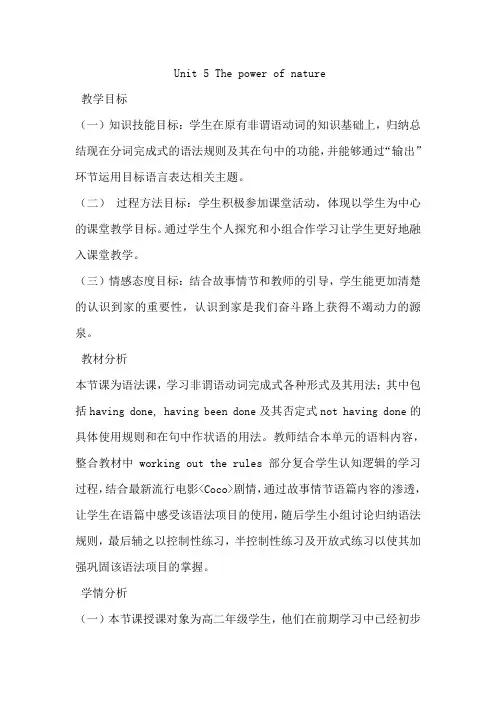
Unit 5 The power of nature教学目标(一)知识技能目标:学生在原有非谓语动词的知识基础上,归纳总结现在分词完成式的语法规则及其在句中的功能,并能够通过“输出”环节运用目标语言表达相关主题。
(二)过程方法目标:学生积极参加课堂活动,体现以学生为中心的课堂教学目标。
通过学生个人探究和小组合作学习让学生更好地融入课堂教学。
(三)情感态度目标:结合故事情节和教师的引导,学生能更加清楚的认识到家的重要性,认识到家是我们奋斗路上获得不竭动力的源泉。
教材分析本节课为语法课,学习非谓语动词完成式各种形式及其用法;其中包括having done, having been done及其否定式not having done的具体使用规则和在句中作状语的用法。
教师结合本单元的语料内容,整合教材中working out the rules 部分复合学生认知逻辑的学习过程,结合最新流行电影<Coco>剧情,通过故事情节语篇内容的渗透,让学生在语篇中感受该语法项目的使用,随后学生小组讨论归纳语法规则,最后辅之以控制性练习,半控制性练习及开放式练习以使其加强巩固该语法项目的掌握。
学情分析(一)本节课授课对象为高二年级学生,他们在前期学习中已经初步掌握非谓语动词的一般式在句中作主语,宾语,表语,定语,状语,补语等各类成分的使用,并能比较正确的使用以上语法项目进行写作和口语的输出。
基于这种情况,学生能够比较好的本课中继续进行同知识领域的语法项目的继续建构。
(二)高二年级的学生有比较强的好奇心,选择<Coco>电影作为整节课的语言输入和输出语境,能够比较好的激发学生的兴趣,使其更好的融入语境,从而为语言学习做好准备。
(三)学生根据课堂设计环节应能比较顺利的完成语法归纳,但其在用英文表述语法项目时可能会有困难,故而教师会从以下两方面辅助学生总结:1. 尽可能教师在此环节的语言指令,并辅之以例子,使学生明确要求;2. 在学案中给出规则表格和术语提示,从而使学生能够顺利完成任务。
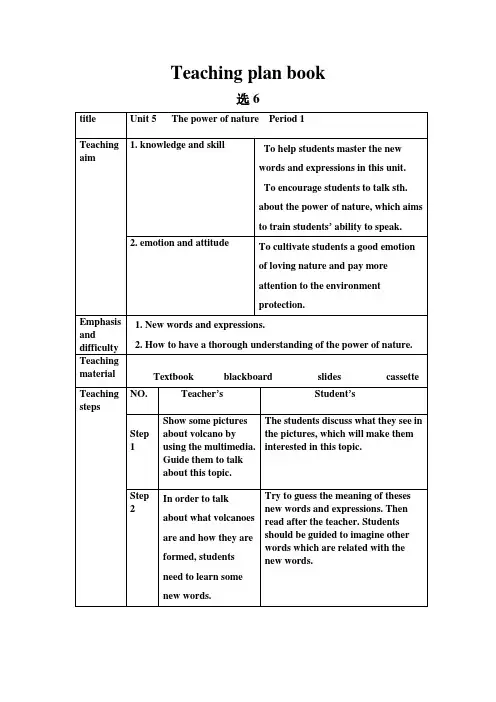
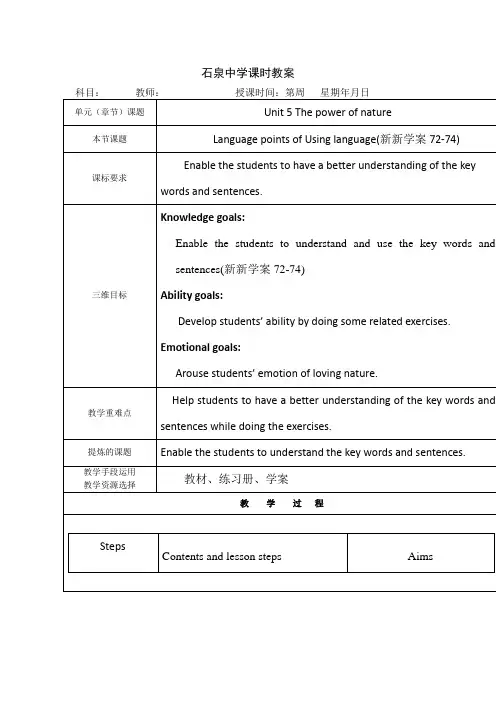
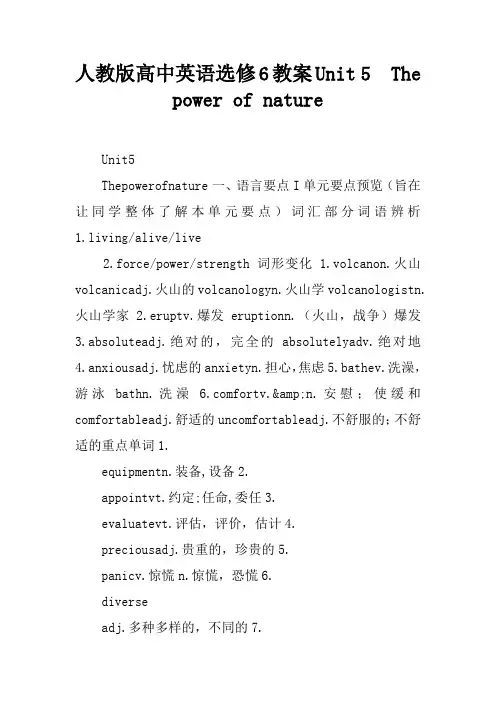
人教版高中英语选修6教案Unit 5 Thepower of natureUnit5Thepowerofnature一、语言要点I单元要点预览(旨在让同学整体了解本单元要点)词汇部分词语辨析1.living/alive/live2.force/power/strength词形变化 1.volcanon.火山volcanicadj.火山的volcanologyn.火山学volcanologistn.火山学家 2.eruptv.爆发eruptionn.(火山,战争)爆发3.absoluteadj.绝对的,完全的absolutelyadv.绝对地4.anxiousadj.忧虑的anxietyn.担心,焦虑5.bathev.洗澡,游泳bathn.洗澡fortv.&n.安慰;使缓和comfortableadj.舒适的uncomfortableadj.不舒服的;不舒适的重点单词1.equipmentn.装备,设备2.appointvt.约定;任命,委任3.evaluatevt.评估,评价,估计4.preciousadj.贵重的,珍贵的5.panicv.惊慌n.惊慌,恐慌6.diverseadj.多种多样的,不同的7.guaranteevt.保证,担保重点词组compare……with与……比较burntotheground全部烧毁makeone’sway前往sparenoeffort不遗余力,尽力impresssb.withsth.使某人铭记某事重点句子1.Iwasabouttogobacktosleepwhensuddenlymybedroombeca measbrightasday.2.Itissaidthatthisboy,whohadagreatg iftforlanguagesandpersuasion,isthefatherofthemanchu people.重点语法动词形式ing作状语II词语辨析1).living/alive/liveadj.活的【解释】living可作定语又可作表语;可用于指人也可用于指物,指人时可表示“健在”此时指和”死”相对的活着。
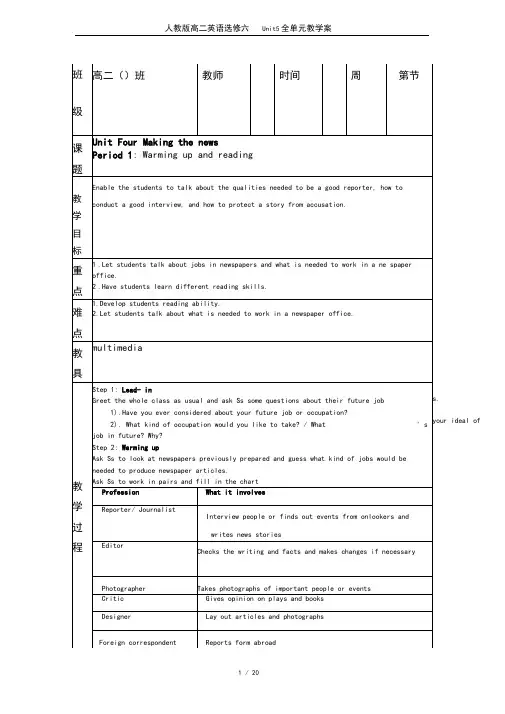
作业布置教学反思l.occupation n.工作;职业;消遣;侵占,占领; vt.占用(时间,空间,面积等) sb be occupied with sth/in doing sth 某人忙于做某事 occupy oneself in doing sth 使忙于做某事 2. involve vt. 1. 包括,需要 involve doing sth 2. (使)参加involve sb in doing sth 使某人参加某项活动 3. 牵涉 rm vt 通知;告知 (1)inform sb.of sth. inform sb.that/when/how … keep sb. informed (2)information n. We regret to inform you that your application has been rejected. C The newspapers keep us informed of what is going on around us at any time. 电 [基础练习]——单句语法填空 (1)Had I informed him of the exact time for the meeting earlier, he wouldn ' t have been late yesterday. (2)(2016 江苏高考)From the earliest ages, they desire to help others, tc share information(inform) and to participate in achieving common goals. [能力提升]——单句改错 (3)We were very afraid to keep the staff inform of what we were doing. Inform 一一 informed (4)All of these people gave me lots of informations I had never heard of. Informations finformation 班级高二()班教师 时间 周 第节 Unit Four Making the news Period 2: words and expressions 教学目标Get students to have a good command of the words and expressions in this unit 重点The proper usage of words and expressions 难点How to memorize words and expressions efficiently 教具Multimedia 教学过程告诉某人某事;通知某人某事 通知某人…… 随时向某人报告情况 [U]通知,消息,情报,信息4. case n.情况; 病例 (1)in case (that)in case ofin no case in this/that case (2)as is often the case 这是常有的事Enough space should be given to the kids; in that case, they will get more life experiences.[基础练习]——用case 的相关短语填空(1)You'd better take an umbrella in case of the rain.(2)Mr. Chen is very strict. Anybody should in no case be allowed to be late for his class. (3)It is said that we'll have to do extra work on Sunday. In that case, we can't go to a movie.[能力提升] -- 句式升级(4)You'd better take an umbrella in case it rains [用 in case 改写练习(1)] (5)Mr.Chen is very strict.In no case should anybody be allowed to be late for hisclass.[用倒装句改写练习(2)] (6)It s said that we 'll have to do extra work on Sunday, in which case we can't go to a movie.[用定语从句改写练习(3)]5. demand n.要求;需求 vt.强烈要求(1)be in (great) demand meet/satisfyone s demands (2)demand to do sth.demand that...(should) do sth.(3)sth.demand(s) to be donesth.demand(s) doingR 事需要被做 Q 联想发散除demand 之外,后接宾语从句中用虚拟语气的其他动词还有哪advise 、suggest 、desire 、command 、recommend 、urge 、order 、 require : prefer 等。
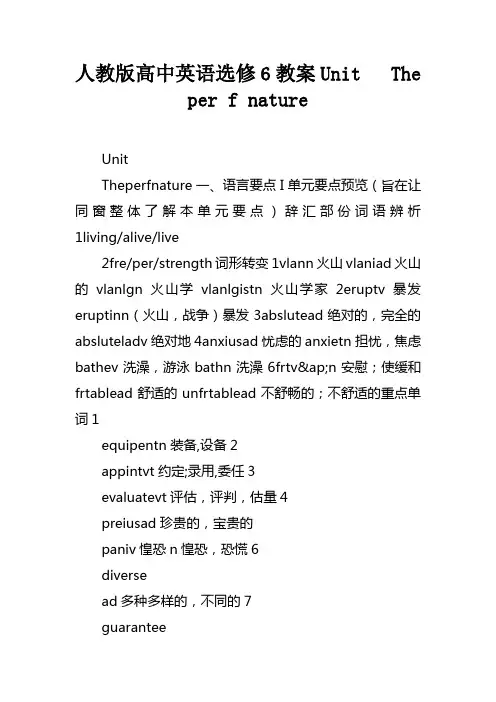
人教版高中英语选修6教案Unit Theper f natureUnitTheperfnature一、语言要点I单元要点预览(旨在让同窗整体了解本单元要点)辞汇部份词语辨析1living/alive/live2fre/per/strength词形转变1vlann火山vlaniad火山的vlanlgn火山学vlanlgistn火山学家2eruptv暴发eruptinn(火山,战争)暴发3abslutead绝对的,完全的absluteladv绝对地4anxiusad忧虑的anxietn担忧,焦虑bathev洗澡,游泳bathn洗澡6frtv≈n安慰;使缓和frtablead舒适的unfrtablead不舒畅的;不舒适的重点单词1equipentn装备,设备2appintvt约定;录用,委任3evaluatevt评估,评判,估量4preiusad珍贵的,宝贵的paniv惶恐n惶恐,恐慌6diversead多种多样的,不同的7guaranteevt保证,担保重点词组pare……ith与……比较burntthegrund全数烧毁aene’sa前去spareneffrt 不遗余力,尽力ipresssbithsth使某人铭刻某事重点句子1Iasabuttgbatsleephensuddenlbedrbeaeasbrightasda 2Itissaidthatthisb,hhadagreatgiftfrlanguagesandpersu asin,isthefatherftheanhupeple重点语法动词形式ing作状语II词语辨析1)living/alive/livead活的【说明】living可作定语又可作表语;可用于指人也可用于指物,指人时可表示“健在”现在指和”死”相对的活着。
alive可作表语,后置定语或补语。
多用于指人,往往指虽有死的可能,但目前仍是活着的,强调“活着的”本身。
live要紧用于指物,表示“活的、有生命的”,还能够表示“实况转播的”。
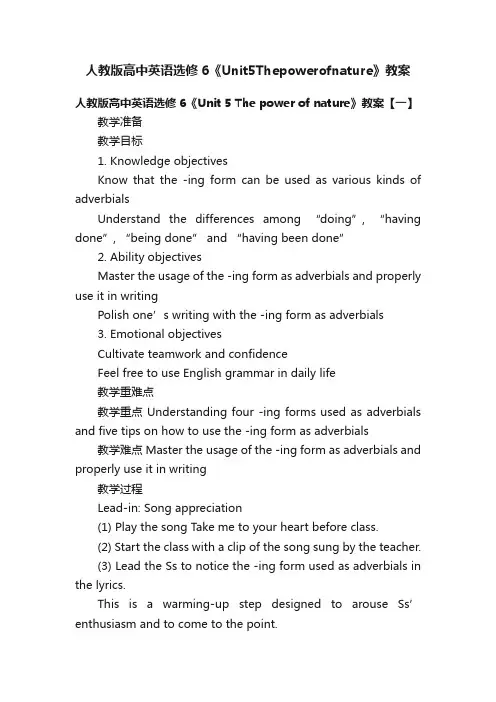
人教版高中英语选修6《Unit5Thepowerofnature》教案人教版高中英语选修6《Unit 5 The power of nature》教案【一】教学准备教学目标1. Knowledge objectivesKnow that the -ing form can be used as various kinds of adverbialsUnderstand the differences among “doing”, “having done”, “being done” and “having been done”2. Ability objectivesMaster the usage of the -ing form as adverbials and properly use it in writingPolish one’s writing with the -ing form as adverbials3. Emotional objectivesCultivate teamwork and confidenceFeel free to use English grammar in daily life教学重难点教学重点 Understanding four -ing forms used as adverbials and five tips on how to use the -ing form as adverbials 教学难点 Master the usage of the -ing form as adverbials and properly use it in writing教学过程Lead-in: Song appreciation(1) Play the song T ake me to your heart before class.(2) Start the class with a clip of the song sung by the teacher.(3) Lead the Ss to notice the -ing form used as adverbials in the lyrics.This is a warming-up step designed to arouse Ss’ enthusiasm and to come to the point.Step 1: We ChooseTask 1: Observe the -ing form in each sentence and decide what it refers to.(reason, result, concession, time, manner, condition)1. Being very rich, he spends as much money as he likes. (reason)2. Working hard, you’ll surely succeed. (condition)3. They sat there, waiting for the beginning of the sports meeting. (manner)4. Walking on the street, he came across a long-lost friend. (time)5. The polar bear was not careful enough, falling on the icy ground. (result)6. Not understanding what you are talking about, I still admire you. (concession)It is intended to remind Ss that the -ing form can be used as various kinds of adverbials. Ask several Ss to answer and, if necessary, interpret the sentences for them with adverbial clauses.Task 2: Check the words in red and decide their relation with the subject and the predicate. (A. active B. passive C. meanwhile D. before-after)Laughing and jumping, he left school.Having finished his homework, he left school.Being talked about at that time, he left school.Having been punished, he left school.First, let Ss choose the correct relation between the -ing form and the subject and that between the -ing form and the predicate in each sentence. Then lead Ss to sum up the differences among “doing”, “having done”, “being done” and “having beendone”.Task 3: Read the sentences aloud and recall the tips.When the reading is finished, ask Ss how to use the -ing form as adverbials.It is intended as a transition from “what” to “how” and the second step is naturally introduced.Step 2: We ChangeTask 1: (Group work) Identify the mistakes in the following sentences and change the sentences into correct ones. Discuss your reason.1. I had a wonderful childhood, travel around the world.2. When crossed the road, you should be careful.3. Having not finished his homework, he was punished by his parents.4. Working hard, your dream will come true.It is aimed to revise the usage of the -ing form as adverbials. By group discussion, Ss may find it easier to solve the problem. Matters such as non-predicate, relation, conjunction, negative words and logical subject are all involved.Task 2: (Pair work) Orally change the adverbial clauses or compound sentences into the -ing form as adverbials.e.g. After we have been informed of Mr. Li’s birthday, we hurried to express our best wishes on the blackboard.(Notice that only the clause part will be changed: predicate→non-predicate)Having been informed of Mr. Li’s birthday, we hurried to……1. Because we hoped to convey our concern for him, we asked Miss Zhu to bring him a card.2. When we danced together, we felt very excited.3. Although we had not met him before, we still treated himas an old friend.4. If you think it over, you will have a good idea.5. She stood on the stage and played with her hair.6. He was so humorous that he made us burst into laughter.It is designed for Ss to put into practice the tips mentioned in the previous task.Step 3: We ChatTask 1: Using the correct form of the given verbs, help me to complete the caption of my moment.Last month, I led my students to join in the oral English competition.(live) far away from the site, we had to get up early in the morning. (not eat) anything before, I felt hungry. As for the students, though tired, they were still enthusiastic about the coming challenge, (talk and laugh) on the bus. When (arrive) at the site, they were very excited.(devote) to practicing before, they did a wonderful job in the competition, (bring) glory to our school. As far as I am concerned, (make) great efforts to practice, any of you can also stand out.It is a revision of the tips mentioned. In addition, it sets an example of how to use the -ing form as adverbials in our daily life.Task 2: Writingo Choose a picture to post.o Write the caption for it.o Try to use the -ing form as adverbials. (3 minutes)Ss are asked to choose a picture from five and write the caption for it by using the -ing form as adverbials in 3 minutes. This is to integrate what has been covered and put it into practice.Task 3: Sharingo Move around the classroom.o Share your moment.o Get “like” or “comment”.(You may also leave your comment when discovering any grammatical mistake.)An example is shown to clarify the instruction. Then Ss are given five minutes to share their moments with their classmates. This is a peer proof-reading activity.Task 4: Presentingo How many“ likes” have you got?o What about “comments”?o Who would like to share with the whole class your moment or the comments you got?This is for several volunteers to present their works and notice the common mistakes when using the -ing form as adverbials.Step 4: SummarySummarize what we have learnt today:o 6 kinds of adverbialso 4 forms of -ingo 5 tipsThis is to remind Ss of what they have learnt today.课后习题Homeworko Review the usage of the –ing form as adverbials.(You may refer to a mini-lecture. )o Polish your caption and share it with your friends.o Finish exercise 3 - 5 on Page 64 of your exercise book.The homework is intended to familiarize Ss with the rules of the -ing form used as adverbials and to develop their writingskills.人教版高中英语选修6《Unit 5 The power of nature》教案【二】教学准备教学目标教学目标:1 深入理解课文,分析文章长难句,培养快速阅读、整体理解和写作的能力。
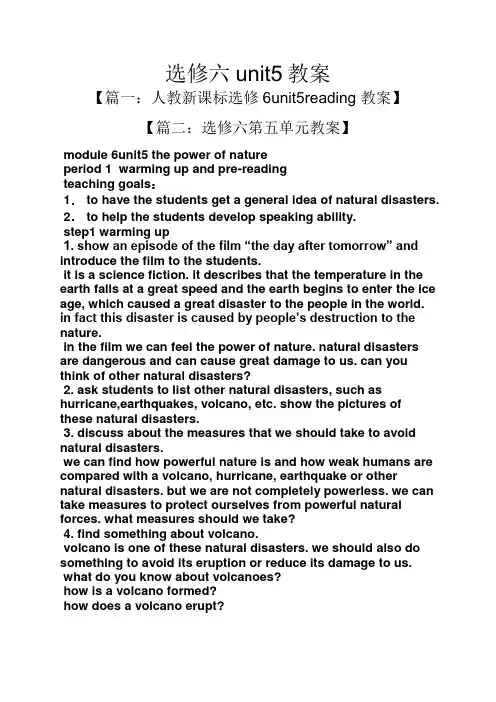
选修六unit5教案【篇一:人教新课标选修6unit5reading 教案】【篇二:选修六第五单元教案】module 6unit5 the power of natureperiod 1 warming up and pre-readingteaching goals:1. to have the students get a general idea of natural disasters. 2. to help the students develop speaking ability.step1 warming up1. show an episode of the film “the day after tomorrow” and introduce the film to the students.it is a science fiction. it describes that the temperature in the earth falls at a great speed and the earth begins to enter the ice age, which caused a great disaster to the people in the world. in fact this disaster is caused by people’s destruction to the nature.in the film we can feel the power of nature. natural disasters are dangerous and can cause great damage to us. can you think of other natural disasters?2. ask students to list other natural disasters, such as hurricane,earthquakes, volcano, etc. show the pictures of these natural disasters.3. discuss about the measures that we should take to avoid natural disasters.we can find how powerful nature is and how weak humans are compared with a volcano, hurricane, earthquake or other natural disasters. but we are not completely powerless. we can take measures to protect ourselves from powerful natural forces. what measures should we take?4. find something about volcano.volcano is one of these natural disasters. we should also do something to avoid its eruption or reduce its damage to us.what do you know about volcanoes?how is a volcano formed?how does a volcano erupt?5. if we can predict the eruption of volcanoes, we can reduce its damage to us. so we need volcanologists to study volcanoes.do you want to be a volcanologist? why?if you are a volcanologist, what kind of work should you do and what kind of danger will you meet? step2 pre-readingmake a questionnaire as on page33 and help them know whether they are interested in volcanology. homework:1. find more information about natural disasters, especially volcanoes.2. read articles about some famous volcanoes eruption.period 2 reading and comprehendingteaching goals:1. to improve the students’ reading abilities.2. to help the students to know how to summarize a text or a paragraph.step 1 lead-in1. free-talkask some students to describe some famous volcano eruption according to theirafter-class reading.2. show the video of volcano eruption.we can enjoy the exciting sight of volcano eruption. but volcano eruption can also bring us a lot of damage. so we need volcanologists to study volcano and reduce its damageto us. let’s learn something aboutvolcanologists in the text.step 2 skimming1. read through the passage quickly and find out the answers to the questions.1) what kind of things should a volcanologist do?2) what is the volcanologist wearing when getting close to the crater?2. divide the passage into several parts and find out the main idea of each part.step 3 scanningscan the passage .read the passage carefully and answer the following questions.1. why is a volcanologist’s job important?2. where is mount kilauea?3. why is the lava that flows on mount kilauea more dangerous than the actual eruption?4. what caused the writer’s bedroom to become as bright as day even though it was night?5. why did the scientists have to get close to the volcano after it began erupting?6. why was it difficult for the writer to walk towards the edge of the crater?7. what does the writer find impressive about volcanoes even after studying them for 20 years?step 4 discussiondo you think it is an occupation you would enjoy? discuss your reasons with your classmates.step 5 interviewmake up an interview. four students as a group. one student acts as the writer of the passage. the other three students act as the journalists from three different tv stations.homework:spend some time researching one disaster. you can use books, magazines, newspapersor the internet. collect pictures and diagram and look for information about:what causes this kind of disasteractual events that happened in the past in china and/or the rest of the worldhow people helped the victimswhat is being done to prevent the disaster happening again or to lessen the damageperiod 3 learning about languageteaching goals:1. to help the students to learn how to use words and expressions.2. to review the v-ing form and learn the perfect v-ing form.step 1 discover useful words and expressions1. show the video of an episode of vesuvius eruption and ask students to fill in the text with proper words.the eruption of mount vesuvius in 79ad took people in pompeii by surprise. it was so quick and so severe that the town was soon covered in ________ and ________. many houses in the town were ________. it was an ________ disaster for manypeople who could not get away in time. a writer named pliny, who was there during the _______, described how lava was thrown into the air like a ________. ________ many of the townspeople, ________ at the ________ sight of vesuvius eruption, stayed too long and failed to escape in time.2. find suitable words or expressions from the texts in the unit to fill in the blanks on page35.step2 grammar1. show a flash to review the differences between v-ing and the past participle.a. 现在分词表示主动,过去分词表示被动。
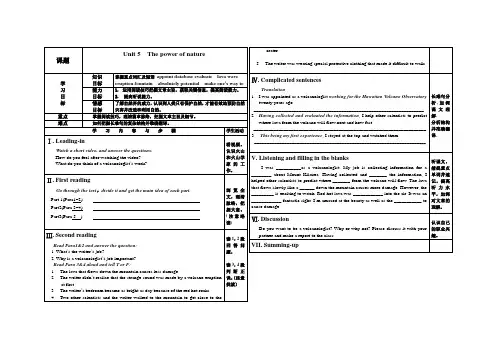
Unit 5 The power of nature Ⅰ. 单元教学目标 技能目标 Skill Goals ▲Talk about volcanoes and the work of volcanologists ▲Practise expressing fear and anxiety ▲Learn the -ing form used as adverbial in a sentence ▲Write about an experience in a natural disaster and hot pools at Changbaishan Ⅱ. 目标语言 Expressing fear and anxiety 功 I was so excited about what I had done and where I was, I forgot my fear. 能 I was very worried that ... 句 I was very relieved when ... 式 I was trembling almost as much as the ground under my feet. I was still terrified. I was so nervous that my whole body was damp with sweat. I was so anxious that I couldn’t move for a long time. I had to force myself not to panic. Then I got up the courage to ... 1. 四会词汇 volcano, erupt, eruption, ash, hurricane, adventure, bore, excite, evaluate, unfortunate, unfortunately, fountain, absolute, absolutely, fantastic, crater, potential, impress, impressive, precious, novelist, cancel, effort, relieve, tremble, sweat, anxiety, anxious, 词 panic, courage, typhoon, heaven, diverse, diversity, unique, bathe, swallow, 汇 guarantee 2. 认读词汇 volcanology, volcanologist, observatory, lava, Mount Kilauea, molten, crane, leopard, Siberian, spectacular, crystal, crystal clear, peak, persuasion, Manchu 3. 词组 compare ... with, burn to the ground, make an effort, make one’s way, glance through, vary from ... to ... 4. 重点词汇 volcano, ash, lava, adventure, erupt, excite, fountain, fantastic, impressive, relieve, anxiety, anxious, panic, courage 1. Having collected and evaluated the information, I help other scientists to predict where lava from the volcano will flow next and how fast. P34 重 2. I was about to go back to sleep when suddenly my bedroom became as bright as 点 day. P34 句 3. However, the most important thing about my job is that I help protect ordinary 子 people from one of the most powerful natural forces on earth — the volcano. P34 4. It wasn’t very easy to walk in these suites, but we slowly made our way to the edge of the crater and looked down into the red, boiling centre. P35 5. The height of the land varies from 700 metres above sea level to over 2,000 metres and is home to a great diversity of plants and animals. P39 Ⅲ 教材分析与教材重组 . 1. 教材分析 本单元以 The power of nature 为话题,旨在通过单元教学使学生了解火山爆发、地震、台风、洪水等自 然现象,认识到自然的伟大力量,并会用所学词汇描述在经历自然灾害时的感受,思考人类应对自然灾 害的态度和方法,提高自我保护意识。
Unit 5 The power of natureReading教案Teaching goals 教学目标1. Target language 目标语言a. 重点词汇和短语volcano, erupt, compare with, hurricane, adventure, bored, excite, evaluate, unfortunately, burn to the ground, eruption, fountain, absolutely, fantastic, made one’s way, potential, impressiveb. 重点句式P341. Having collected and evaluated the information, I help other scientists to predict where lava from the volcano will flow next and how fast. P342. I was about to go back to sleep when suddenly my bedroom became as bright as day. P343. However, the most important thing about my job is that I help protect ordinary people from one of the most powerful natural forces on earth — the volcano. P342. Ability goals 能力目标Enable the students to learn about the powerful natural force — volcano and the work of an volcanologist.3. Learning ability goals 学能目标Help the students learn how to analyze the way the writer describes his exciting job.Teaching important points 教学重点Read the text and answer the questions in Comprehending Exercise 2.Teaching difficult points 教学难点Retell the writer’s first sight of Mount Kilauea eruption.Teaching methods 教学方法Discussion, reading, speaking and cooperative learning.Teaching aids 教具准备A projector and some slides.Teaching procedures && ways 教学过程与方式Step ⅠWarming UpLead the students to the topic by telling them a story. Then get the students to describe a volcano eruption according to the diagram. After they are familiar with the topic, let them list some other powerful natural forcesand discuss the ways human beings protect themselves from the natural forces.T: Listen to me carefully. I will tell you a story about a strange city. The strange city named Pompeii is a dead city. No one has lived there for nearly two thousand years, yet every year thousands of people travel from distant countries to visit it. It died suddenly in a terrible rain of fire and ash. Tons of hot ash fell on Pompeii, hiding it from sight. For three days the sun didn’t break through the clouds of ash in the sk y. Then the whole city shook and buildings fell down. When everything was calm, Pompeii was buried deep. A city disappeared and people there lost their lives too. Can you guess what had happened to the city?S1: There must have been a terrible earthquake. After the terrible quake, everything was destroyed.T: Yes. It’s one kind of the causes. Any different ideas?S2: Maybe a volcano erupted and a terrible rain of fire and ash fell on the city.T: You got it! Mount Vesuvius, which had slept quietly for centuries, erupted suddenly. It destroyed the city Pompeii. How terrible! Have you ever seen a volcano erupting? Please turn to page 33. Look at the diagram. Describe a volcano erupting using the diagram and the given words.S3: When boiling rock erupts from the volcano, the red hot lava rushes hundreds of metres into the air and a cloud of ash goes straight up into the air. Ash cloud forms. Rocks, fire, ash fall onto the ground. The lava flows slowly down the mountain. It buries everything in its path under the molten rock.S4: Sometimes, volcano erupting can cause some other disasters like earthquakes, fire and ground sea.T: How powerful the nature is! The lava can buries everything in its path. A volcano erupting can damage a city. A flood can carry everything in its path, while a fire will damage everything it meets. It seems that we human beings are powerless in front of these natural forces. What can we do to protect ourselves from powerful natural forces? Please work in groups of four to list some other natural forces and discuss the ways that human beings protect ourselves.A few minutes later.T: Who would like to share your opinion with the class?S5: I’d like to talk about volcano. Sometimes, the volcano gives warnings in the form of many small earthq uakes. And scientists can provide warnings of possible volcano explosions with the help of equipment. So the government can help people who live near the volcano leave their homes before erupting.S6: We are more familiar with fire. In fact, it can be avoided most of the time, if we are careful in our daily life. I know a way of controlling the fire. Firefighters burn the trees which are in the path of the fire, so there is nothing to burn when the fire arrives.S7: Flood always happens in the south of our country. Predication is very important. Scientist keep observing thelevel of the water during the summer. People strengthen the bank and move to higher land.S8: We have learned more about earthquakes. People have learned many ways to protect themselves. For example, earthquake happens, if you are in bed, stay where you are and protect your head with a pillow. If you are outdoors, find a clear spot away from buildings, trees and streetlights.S9: I think the best way is to move to a safer place where fire, earthquake, flood and hurricane will never happen.Step ⅡPre-readingGet the students to answer the six questions on page 33 to find out whether they will enjoy working as a volcanologist. And then get them to talk about the occupation according to the questions.T: I see. Prediction is very important. We can say scientists play an important part in protecting people from natural forces. Would you like to study volcanoes? And do you want to be a volcanologist?Ss: Yes.T: Let’s test whether you are suitable for this job or not. Answer “yes” or “no” to these que stions on page 33.The students answer the questions to see if they are suitable to be a volcanologist.T: Are you suitable for the job? Who can tell us what kind of person can be a volcanologist?S1: First he must be brave enough because he must climb into a live volcano to take the temperature of the boiling rock inside.S2: I think interest is the most important. He should show great interest in studying rocks and volcanoes.S3: He should be interested in travelling to unusual places and like adventure in his life.S4: If you want to be a volcanologist, you should enjoy working outside because a lot of work need to be done outdoors.Step ⅢWhile-readingScanningGet the students to read the passage quickly and accurately. Give them a couple of minutes to look through the whole passage. Tell them to read the text silently and then ask them some detailed questions about the text.T: What do es a volcanologist do? Is the work interesting? Let’s read a passage written by a volcanologist. The volcanologist enjoys his job very much. He described his exciting job. And he wrote down his first sight of an eruption. Now let’s read the text quickly an d find out the answers to these questions Comprehending Exercise 1 on page 35 .Several minutes later.Check the answer..SkimmingIn this part, the students will read the text quickly to get the general idea of the passage. Check the answers with the whole class, then explain some sentences or words that the students may find hard to understand.T: Now please read the text again and try to get the main idea of the passage in groups of four.Three or four minutes later.T: Have you got the general idea of the text?It wasn’t very easy to walk in these clothes, and we slowly made our way to the edge of the crater and looked down into the red, boiling center. Though I was a little afraid, I wanted to climb down into the crater to collect some lava. But this being my first experience, I could only stayed at the top and watched the two scientists. At that time I determined to be a volcanologist forever.DiscussionT: In the writer’s opinion, his job is the greatest one. Do you like this occupation? Why or why not? Discuss in groups of four.S2: I would not like to be a volcanologist. I prefer to work in an office to do some research work. It’s a waste of time and energy to spend so much time traveling.S3: I hope to be a vocanologist. You’ll be proud of yourse lf when people escape before volcano erupting because of your work. Also, I am interested in the rocks and other things that make up the surface of the earth. I want to know the secret of the earth.S4: It is not my ideal occupation. I like traveling to unusual places, studying different cultures, talking with interesting people and collecting interesting things. But I’m not brave enough to climb into a live volcano to take the temperature of the boiling rock inside.S5: I don’t like this job. It’s too dang erous. If the volcano erupts suddenly when you are collecting the lava, maybe you will lose your life.T: Well, if you meet the writer, what kind of questions would you ask him?S6: Aren’t you afraid when you walk towards the volcano? It’s so hot and the v olcano may erupt again.S7: What should you do if you get lost on your way to the volcano?S8: When did you begin to be interested in volcanoes?S9: How will you escape if the volcano erupts suddenly?S10: Are there any living things in volcanoes?S11: Why do people live near the volcanoes since they may lose their homes or even lives?Writing characteristicsT: Good! If you are interested in this occupation, you can get more information on the Internet. Now who can summarize the writing style and techniques of this text?The teacher can ask the students to have a discussion in pairs or groups, and then ask some of them to show their ideas.Sample answers:This passage was written by a volcanologist. He uses the first person to describe his exciting job and his experience and express his true love for his job. The words are vivid and the description is natural, which makes the readers feel as if they were watching the volcano eruption and begin to like the occupation. For example, he uses “like a railway train passing outside my window”, “suddenly my bedroom became as bright as day” and “red hot lava was fountaining hundreds of metres into the sky” to describe the big noise and fantastic sight of volcano eruption. To tell readers that his job is intere sting, the writer uses several “sometimes”, which makes the readers feel the job is extremely interesting and want to be a vocanologist. The writer talks about the volcano objectively. He points out the damages of volcano but he praises its fantastic sight at the same time.T: What can we learn from the text?S: The key word of the text is “exciting”, which is the focus of the passage. By telling the readers his everyday work, the importance of his job, his first sight of volcano eruption and his sincere love for his job, the author proves it’s his chief enjoyment to be a volcanologist. And I appreciate the writer’s attitude towards nature. We should love nature and we can do something to minimize the damage caused by natural forces.Step ⅤHomeworkT: No w it’s time for homework. Today you have two tasks to finish after class. The first task is to finish exercises in Discovering useful words and expressions on page 35. These exercises will help you practice the words and expressions we’ve just learned. The second one is to retell the text. That’s all for today. See you tomorrow.。
教案6 人教选修6 Unit 5 The power of natureListening and WritingTeaching goalsEnable the students to listen for details and catch the specific information as much as possible.Learning ability goalsEnable the students to predict some important information in the process of listening and encourage the students to talk about the situations according to the listening materials.Teaching important and difficult pointsHow to make sure the answers of listening material and help them to describe the disaster they have experienced.Teaching aidsA recorder and cassette tapes, a projector, and a computerTeaching proceduresStep 1Pre-listeningCan you imagine the volcanologists’ work?They often face the dangerous situation.Can you guess what the followi ng three volcanologists’ most frightening experi ences are?Step 2 ListeningLook at the pictures of volcanologists at work on page 38. Then listen to the m talking about their most frightening experience. Write their names under the picture.A. Frank GoreB. Jane SmallC. Sarah TangListen to the tape again, and answer the following questions.1. How long has she been a volcanologist?2. In what country was the volcano he/she talks about?3. Why did he/she forget to be frightened?Jane Small1.How long has she been a volcanologist?Five years.2. In what country was the volcano she talks about?Alaska3. Why did she forget to be frightened?She was excited about what she had done.Frank Gore1.How long has he been a volcanologist?Ten years.2.In what country was the volcano he talks about?Hawaii.3.Why did he forget to be frightened?The pilot had to fly low to get under the clouds.Sarah Tang1.How long has she been a volcanologist?Twenty years.2.In what country was the volcano she talks about?New Zealand.3.Why did she forget to be frightened?She felt the ground tremble.ListeningListen to the tape once more. Write the name of the person beside the things they said.1. I was so excited about what I had done and where I was, I forgot my fea r.( )2. I was very worried that the volcano might erupt while I was still inside it. ( )3. I was very relived when we finally reached our camp. ()4. I was trembling almost as much as the ground under my feet. ()5. I was still terrified. ( )6. I was so nervous that my whole body was damp with sweat. ()7. I was so anxious that I couldn’t move for a long time. ()8.I had to force myself not ton panic. ( )9.Then I got up the courage to bend over the boiling lava. ( ) Step 3 SpeakingThink of a powerful natural disaster (such as an earthquake, food, typhoon, sto rm) that you have experienced. You can use your imagination if you have not experienced any of these things. Tell your partner about your experience and how you felt.Writing1. Choose one of the natural disasters or any other disaster you have experien ced.2. Make a timeline to show the order in which the events happened. For exam ple:10am left holiday house to walk in the mountains12am saw dark clouds in the sky, started to go back12:30pm snowstorm started1:00pm we were completely lost… …3. Spend a few minutes on your own imagining your experiences and how yo u felt. Now imagine you are safely back home. Write a dairy entry about your experience.A possible version:Jane and I had been waking in the mountains when we noticed some dark cl ouds coming down the mountain. We decided to turn around and go home.As we walked the clouds got nearer and nearer and the day grew darker. Th en all of a sudden it began to snow. It was soon snowing so hard we couldn’t see very far in front of us. Holding each others’ hands so we couldn’t get s eparated, we continued down the mountain. Butthe snow got deeper and deeper. Walking became harder and harder. We began to get very tired and very frig htened.After a while the path became buried under the snow and we didn’t know which way to go. We were completely lost. We found some shelter behind a big rock. Hugging each other for warmth, we stayed like that until the storm was over. Luckily it only lasted an hour or two. Then the sun came out again and we could see our house in the distance. We were so relieved we both b urst into tears.Step4 HomeworkFinish your writing.。
石泉中学课时教案品味人生1、不管鸟的翅膀多么完美,如果不凭借空气,鸟就永远飞不到高空。
想象力是翅膀,客观实际是空气,只有两方面紧密结合,才能取得显着成绩。
2、想停下来深情地沉湎一番,怎奈行驶的船却没有铁锚;想回过头去重温旧梦,怎奈身后早已没有了归途。
因为时间的钟摆一刻也不曾停顿过,所以生命便赋予我们将在汹涌的大潮之中不停地颠簸。
3、真正痛苦的人,却在笑脸的背后,流着别人无法知道的眼泪,生活中我们笑得比谁都开心,可是当所有的人潮散去的时候,我们比谁都落寂。
4、温暖是飘飘洒洒的春雨;温暖是写在脸上的笑影;温暖是义无反顾的响应;温暖是一丝不苟的配合。
5、幸福,是一种人生的感悟,一种个人的体验。
也许,幸福是你风尘仆仆走进家门时亲切的笑脸;也许,幸福是你卧病床上百无聊赖时温馨的问候;也许,幸福是你屡遭挫折心灰意冷时劝慰的话语;也许,幸福是你历经艰辛获得成功时赞赏的掌声。
关键的是,你要有一副热爱生活的心肠,要有一个积极奋进的目标,要有一种矢志不渝的追求。
这样,你才能感受到幸福。
6、母爱是迷惘时苦口婆心的规劝;母爱是远行时一声殷切的叮咛;母爱是孤苦无助时慈祥的微笑。
7、淡淡素笺,浓浓墨韵,典雅的文字,浸染尘世情怀;悠悠岁月,袅袅茶香,别致的杯盏,盛满诗样芳华;云淡风轻,捧茗品文,灵动的音符,吟唱温馨暖语;春花秋月,红尘阡陌,放飞的思绪,漫过四季如歌。
读一段美文,品一盏香茗,听一曲琴音,拾一抹心情。
8、尘缘飞花,人去楼空,梦里花落为谁痛?顾眸流盼,几许痴缠。
把自己揉入了轮回里,忆起,在曾相逢的梦里;别离,在泪眼迷朦的花落间;心碎,在指尖的苍白中;淡落,在亘古的残梦中。
在夜莺凄凉的叹息里,让片片细腻的柔情,哽咽失语在暗夜的诗句里。
9、用不朽的“人”字支撑起来的美好风景,既有“虽体解吾犹未变兮”的执着吟哦,也有“我辈岂是蓬蒿人”的跌宕胸怀;既有“我以我血荐轩辕”的崇高追求,也有“敢教日月换新天”的豪放气魄。
33 我是一只蜜蜂,在祖国的花园里,飞来飞去,不知疲倦地为祖国酿制甘甜的蜂蜜;我是一只紫燕,在祖国的蓝天上,穿越千家万户,向祖国向人民报告春的信息;我是一滴雨点,在祖国的原野上,从天而降,滋润干渴的禾苗;我是一株青松,在祖国的边疆,傲然屹立,显示出庄严的身姿。
(6,5)重点词汇:1. vt.(1)任命,委派(2)约定(时间、地点等)We must appoint someone to act as secretary.appoint sth.(for sth.)(为某事)确定(日期、场所)The time appointed for the meeting was 10∶30.appointment n.任命;约会make an appointment with sb.与某人约会keep/break an appointment守/违约I have an appointment with my old friend this Sunday.You’d better not break your appointment.I called the airline to________my flight reservation a week before I left for Canada. A.appoint B.obtain C.confirm D.admit2. v.适合某人,对(某人)方便①The new dress suited her very well.②The seven o’clock train will suit us very well.③If you want to go by bus,that suits me fine.④Would it suit you to come at five?辨析:fit,suit与match(1)fit多指衣服等尺寸、大小合身,合适。
I tried the dre ss on but it didn’t fit.It was too small.(2)suit指衣服等颜色、款式、花样等适合。
合乎需要、口味、条件等Does this skirt suit me?(3)match意为“使相称,使相配,使匹配”,指事物在大小、色调、性质等方面的搭配。
Her clothes don’t match her age.1. —What can I do for you? —I want to buy a red tie to________my new shirt.A.fit B.match C.suit D.be fit for2. (天津卷)Her shoes______her dress;they look very well together.A.suit B.fit C.compare D.match3. —How about eight o’clock outside the cinema?—That________me fine.A.fit B.meets C.satisfies D.Suits3. adj.忧虑的;不安的n.担心;忧虑;渴望adv.焦虑地;不安地I’m very anxious about my son’s health.She was anxious for them all to leave her room.Many people were anxious to volunteer their service to the earthquake-stricken areas.with anxiety焦虑地We waited for news with a growing sense of anxiety.My mother always gets a bit________if we don’t arrive when we say we will.A.anxious B.ashamed C.weak D.patient4. vi.& vt.(panicked/panicking)(使人或动物)受惊;惊慌n.惊慌;恐慌The crowd panicked at the sound of the guns.She got into a real panic when she thought she’d lost the tickets.Shoppers fled the street in panic after two bombs exploded in central London.He________and ran as fast as he could to safety.A.paniced B.panicked C.to panic D.panicking5. vt.担保n.保证,保证书,保修单①We guarantee to deliver within a week.②Take this opportunity,and I guarantee you won’t regret it.③Even if you complete your training,I can’t guarantee you a job.④Wealth is not a guarantee of happiness.⑤You have my guarantee that I’ll finish the job on time.Can you________me a job when I get there?You know,I have to work in order to pay for my schooling.A.provide B.guarantee C.arrange D.apply重点短语:1. 去;前往;前进;成功Look!Many children are making their way to the beach.feel one’s way摸索着前行fight/push one’s way推挤着前行lose one’s way迷路force one’s way out挤出去;冲出去push one’s way in挤进去Without experience in it,we have to feel our way.We fought our way through the forest.I kept silent in the backseat of the car as we made our________to grandma’s.A.decision B.way C.plan D.path2. 由……到……不等Opinions on this matter vary from person to person.(1)vary in sth.(大小、形状等)不同,有别vary with随……变化,改变Prices vary with seasons.vary between...and...从……到……转变(2)various adj.各种各样的;多姿多彩的For various reasons,he didn’t attend the meeting.(3)variety n.种种;多样化a variety of种种The girls come from a variety of different backgrounds.It is obvious that the hopes,goals,fears and desires________widely between men and women,between the rich and the poor.A.change B.perform C.transfer D.Vary重点句型1. The other two climbed down into the crater to collect some lava for later study,but this being my first experience,I stayed at the top and watched them.此处this being...是独立主格结构。
独立主格结构的构成方法:n./pron.+v.-ing/-ed/to do/n./adj./adv./prep.phrase。
其中名词或代词起着逻辑主语的作用;另一部分表示状态、状况或动作。
独立主格结构本身不是句子,但在语义上相当于一个句子。
在句子中作状语,表示时间、原因、条件、伴随等。
独立主格结构一般有逗号与主句分开。
①The guide leading the way,we had no trouble getting out of the forest.②Weather permitting,we will go on an outing to the beach tomorrow.③He left the office,tears in eyes.④He walked into the classroom,his head lowered.⑤There being no one else to turn to,I had to come to see you.1. (重庆卷)The children went home from the grammar school,their lessons________for the day. A.finishing B.finished C.had finished D.were finished2. (山东卷)The country has already sent up three unmanned spacecraft,the mostrecent________at the end of last March.A.has been launched B.having been launched C.being launched D.to be launched3.—Wow!It snowed last night.What a nice world!—You’re right.But it’s more difficult to find my missing keys with snow________the g round. A.covered B.cover C.to cover D.covering4.The car burns more fuel,but________all things into consideration,it’s still a good car. A.taken B.having taken C.taking D.to take5.The boys were happily making a snowman,________with cold.A.their faces red B.their faces were redC.their faces turned red D.their faces to be red2. It is said that this boy,who had a great gift for language and persuasion,is the father of the Manchu people.it为形式主语,代替后面的that从句和不定式短语。